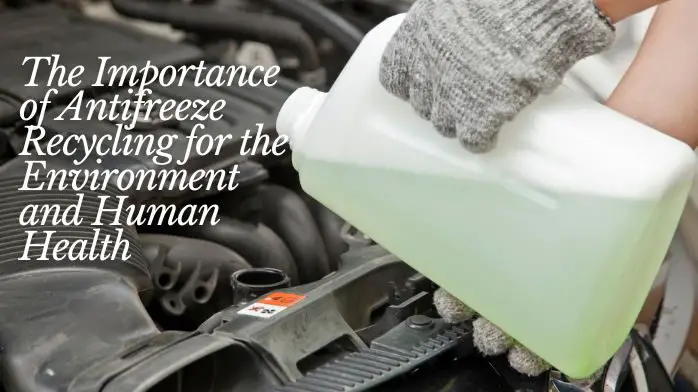Antifreeze recycling is a process in which used antifreeze is treated and restored to a like-new condition. This is typically done to reduce the cost of purchasing new antifreeze and reduce the environmental impact of disposing of used antifreeze. There are several steps involved in the antifreeze recycling process:
- Collection: Used antifreeze is collected from various sources, such as automotive repair shops, fleet maintenance facilities, and car dealerships.
- Transportation: The used antifreeze is transported to a recycling facility in bulk containers or tanker trucks.
- Testing: Upon arrival at the recycling facility, the used antifreeze is tested to determine its quality and to identify any contaminants that may be present.
- Filtering: The used antifreeze is filtered to remove any solids or other contaminants that may have accumulated during use.
- Distillation: The filtered antifreeze is then heated and distilled to separate the various components of the fluid.
- Blending: The distilled components are blended in the correct proportions to create a finished product that meets the required specifications.
- Packaging: The finished product is then packaged and shipped to customers who will use it to refill their vehicles.
Antifreeze recycling can help to reduce waste and conserve resources, and it can also be more cost-effective for businesses and consumers than purchasing new antifreeze.
How to Recycle Antifreeze
If you have used antifreeze that you would like to recycle, there are a few steps you can follow to do so:
- Check local regulations: Some states have regulations regarding the disposal of used antifreeze, so it’s a good idea to check with your local government to see if there are any specific guidelines you need to follow.
- Find a recycling center: Many automotive repair shops and garages offer antifreeze recycling services. You can check with these businesses to see if they will accept your used antifreeze for recycling. You can also check with your local waste management company to see if they offer antifreeze recycling services.
- Transport the antifreeze safely: If you need to transport the used antifreeze to a recycling center, be sure to do so safely and responsibly. Ensure the antifreeze is stored in a sealed container to prevent spills or leaks, and keep it away from children and pets.
- Properly dispose of any waste: If you generate any waste while handling the used antifreeze, such as rags or gloves, be sure to dispose of these materials properly.
By following these steps, you can help to recycle your used antifreeze in an environmentally responsible way.

Where to Recycle Antifreeze
There are several places where you can recycle used antifreeze:
- Automotive repair shops: Many automotive repair shops and garages offer antifreeze recycling services, so you can check with these businesses to see if they will accept your used antifreeze.
- Waste management companies: Many waste management companies offer antifreeze recycling services as part of their hazardous waste disposal programs. You can check with your local waste management company to see if they provide this service.
- Recycling centers: Some recycling centers accept used antifreeze for recycling. You can check with your local recycling center to see if they offer this service.
- Car dealerships: Some car dealerships offer antifreeze recycling services as part of their maintenance programs. You can check with your local dealership to see if they provide this service.
- Online directories: Several online directories can help you find a place to recycle your used antifreeze. These directories typically list local businesses and organizations that offer antifreeze recycling services.
By recycling your used antifreeze, you can help to reduce waste and conserve resources.
The Environmental Impact of Antifreeze Disposal
The environmental impact of antifreeze disposal can be significant. Antifreeze is a hazardous material containing toxic chemicals, such as ethylene glycol, which can harm humans and animals if ingested.
If antifreeze is not disposed of properly, it can leak into the ground and contaminate soil and water sources, leading to environmental pollution. In addition, disposing of used antifreeze in landfills contributes to the overall waste problem and can negatively impact the environment.
On the other hand, recycling used antifreeze can help reduce this hazardous material’s environmental impact. Recycling used antifreeze allows the chemicals in the fluid to be reused rather than disposed of, which can help to conserve resources and reduce the overall demand for new antifreeze. In addition, recycling used antifreeze can help to prevent contamination of soil and water sources, as the recycling process removes contaminants and restores the antifreeze to a like-new condition.
Overall, proper disposal and recycling of used antifreeze can help reduce this hazardous material’s environmental impacts and protect human health and the environment.
The Role of Automotive Repair Shops in Antifreeze Recycling
Automotive repair shops play an essential role in the antifreeze recycling process. Many repair shops generate used antifreeze as a byproduct of their operations, as they regularly change the antifreeze in vehicles as part of routine maintenance and repairs. In addition, many repair shops also offer antifreeze recycling services to their customers, allowing them to dispose of their used antifreeze in an environmentally responsible way.
Some repair shops have on-site antifreeze recycling facilities, while others may collect used antifreeze and transport it to a nearby recycling center. Many repair shops will also accept used antifreeze from other businesses and individuals, providing a convenient location for the public to recycle their used antifreeze.
By offering antifreeze recycling services, automotive repair shops can help to reduce waste and conserve resources, as well as play a role in protecting the environment and public health. In addition, offering antifreeze recycling services can also be a good business opportunity for repair shops, as it can help to differentiate them from their competitors and attract environmentally conscious customers.
Conclusion
Antifreeze recycling is a necessary process that helps to reduce waste, conserve resources, and protect the environment. By recycling used antifreeze, the hazardous chemicals in the fluid can be reused rather than disposed of, which can help to reduce the overall demand for new antifreeze and minimize the environmental impact of this hazardous material.
There are several places where used antifreeze can be recycled, including automotive repair shops, waste management companies, recycling centers, and car dealerships. In addition, online directories can be a helpful tool for finding a place to recycle used antifreeze.
Proper disposal and recycling of used antifreeze are essential for protecting human health and the environment. By following proper handling and disposal guidelines, individuals and businesses can help to ensure that used antifreeze is recycled in an environmentally responsible way.


Thank you for explaining to us that antifreeze contains hazardous materials like ethylene glycol, which is why it needs to be properly disposed of if we don’t want it to leak and seep into the soil until it contaminates the environment. Speaking of glycol, my brother doesn’t know what to do with them now that he recently had his radiators in the factory cleaned and replaced, so he needs to find out where to get rid of glycol soon. I’ll have to help him find a glycol reclaiming service to hire for help soon.